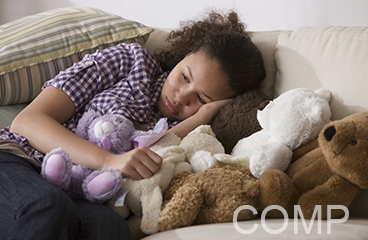
What is stress?
Stress is a feeling that can happen to a child when they have to handle a change or a difficult situation. Even school-age children can feel worried and stressed.
Stress can come from outside, such as family, friends, and school. It can also come from children themselves. Just like adults, children may expect too much of themselves and then feel stressed if they feel that they have "failed."
Children can feel stress that is brief, such as being called on in class or trying out for a team. Or it can last longer, such as after a death in the family or a divorce. For some children, such as those living in poverty, stress may come from long-lasting situations.
In general, anything that may cause children fear and anxiety can cause stress.
Adults can help children with stress in many ways. Three important things you can do are to try to reduce the amount of stress in your lives, help build positive coping skills, and teach children to let stress out.
What are signs of stress in children?
Physical signs
Physical signs of stress in school-age children may include:
- Complaining of headaches or stomachaches.
- Having changes in appetite.
- Having trouble sleeping or changes in sleep habits.
- Needing to use the bathroom often.
- Wetting the bed.
Emotional signs
Emotional signs of stress may include:
- Being distrustful.
- Feeling unloved.
- Not caring about school or friendships.
- Worrying about the future.
Behavioral signs
Behavioral signs of stress may include:
- Acting withdrawn.
- Not wanting to go to school.
- Changes at school, such as with behavior, grades, or friendships.
- Risky behaviors (usually in older children), such as smoking or using alcohol.
What can you do to help with your child's stress?
Try to reduce stress
- Acknowledge your child's feelings. When children seem sad or scared, for example, tell them you notice that they are sad or scared. If appropriate, reassure them that you can understand why they would feel sad or scared.
- Build trust. Let your child know that mistakes are learning experiences.
- Be supportive. Listen to your child's concerns. Allow your child to try to solve their own problems, if you can. But offer to help and be available to your child when they need you.
- Show love, warmth, and care. Hug your child often.
- Have clear expectations without being too strict. Let your child know that cooperation is more important than competition.
- Don't over-schedule your child with too many activities.
Build positive coping skills
- Provide a good example. Keep calm, and express your anger in appropriate ways. Think through plans to reduce stress, and share them with your family.
- Teach about consequences. Children need to learn about the consequences—good and bad—of their actions. For example, if they do all of their chores on time, they will get their allowance. If they break another child's toy, they must find a way to replace it.
- Encourage healthy thinking. Help your child understand what is fantasy and what is reality. For example, help your child see that their behavior didn't cause a divorce.
- Provide your child with some control. Allow your child to make choices within your family framework. For example, let your child arrange their room, choose family activities, and help make family decisions.
Relieve stress in healthy ways
- Exercise. Regular exercise is one of the best ways to manage stress. For children, this means activities like walking, bike-riding, outdoor play, and solo and group sports.
- Write or draw. Older children often find it helpful to write about the things that bother them. Younger children may be helped by drawing about those things.
- Let feelings out. Invite your child to talk, laugh, cry, and express anger when they need to.
- Reduce screen time. Instead, encourage your child to do something else they enjoy, like playing board games, practicing a hobby or spending time with friends. Volunteer work or work that helps others can be a great stress reliever for older children.
- Learn ways to relax. This can include breathing exercises, muscle relaxation exercises, meditating, praying, or yoga.
- Laugh. Laughter really can be the best medicine. You can be a good role model in this area by looking for the humor in life. Your child can learn this valuable skill by watching you.
- Eat healthy foods. Encourage your child to form healthy habits, including choosing healthy foods.
Follow-up care is a key part of your child's treatment and safety. Be sure to make and go to all appointments, and call your doctor if your child is having problems. It's also a good idea to know your child's test results and keep a list of the medicines your child takes.
Where can you learn more?
Go to http://www.healthwise.net/patientEd
Enter I324 in the search box to learn more about "Learning About Stress in Children".
Current as of: October 24, 2024
Author: Ignite Healthwise, LLC Staff
Clinical Review Board
All Ignite Healthwise, LLC education is reviewed by a team that includes physicians, nurses, advanced practitioners, registered dieticians, and other healthcare professionals.

